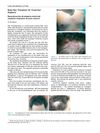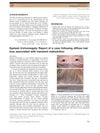 6 citations,
March 2018 in “Journal of Medicinal Food”
6 citations,
March 2018 in “Journal of Medicinal Food” Chicken egg yolk peptides can promote hair growth by increasing a specific growth factor.
 31 citations,
January 1989 in “Clinical and Experimental Dermatology”
31 citations,
January 1989 in “Clinical and Experimental Dermatology” The study tested a hair treatment and found it can help grow hair, but won't stop baldness. It's safe and works well, but needs more testing.
 85 citations,
December 1990 in “Journal of Investigative Dermatology”
85 citations,
December 1990 in “Journal of Investigative Dermatology” Minoxidil promotes hair growth in women with early-stage alopecia.
 5 citations,
April 2005 in “Clinics in Plastic Surgery”
5 citations,
April 2005 in “Clinics in Plastic Surgery” Micrografts and minigrafts for hair restoration provide high patient satisfaction and can cover large areas of hair loss, including sideburns, eyebrows, and beards.
 3 citations,
August 2017 in “PubMed”
3 citations,
August 2017 in “PubMed” A man got a scalp infection from synthetic hair implants because the procedure wasn't done by a doctor and was poorly managed.
 20 citations,
March 1990 in “JAMA”
20 citations,
March 1990 in “JAMA” Topical eye β-blockers may cause hair loss.
 April 2008 in “Obstetrics, gynaecology and reproductive medicine”
April 2008 in “Obstetrics, gynaecology and reproductive medicine” Hirsutism is often caused by high male hormone levels and can be treated with lifestyle changes and medications.
 31 citations,
October 2005 in “British Journal of Dermatology”
31 citations,
October 2005 in “British Journal of Dermatology” Hair loss in women not always linked to increased oil production; other factors may be involved.
 126 citations,
January 1987 in “Journal of The American Academy of Dermatology”
126 citations,
January 1987 in “Journal of The American Academy of Dermatology” The document concludes that understanding hair structure is key to diagnosing hair abnormalities and recommends gentle hair care for management.
 81 citations,
March 2009 in “Seminars in Cutaneous Medicine and Surgery”
81 citations,
March 2009 in “Seminars in Cutaneous Medicine and Surgery” Effective hair loss treatment in women requires correct diagnosis and can include medications like minoxidil, antiandrogens, and treatments for underlying conditions like PCOS.
 25 citations,
July 2017 in “Archives of Dermatological Research”
25 citations,
July 2017 in “Archives of Dermatological Research” Herbal products might promote hair growth with fewer side effects, but more research is needed to confirm their safety and effectiveness.
 8 citations,
March 1979 in “International Journal of Dermatology”
8 citations,
March 1979 in “International Journal of Dermatology” Dr. Vera H. Price's 1979 work emphasizes the importance of accurate diagnosis and personalized treatment for hair loss.
 4 citations,
February 2000 in “Dermatologic Surgery”
4 citations,
February 2000 in “Dermatologic Surgery” The document concludes that Follicular Unit Hair Transplantation is a more precise and effective method for hair restoration.
32 citations,
January 2017 in “Physiology & Behavior” New hair growth corticosterone levels are higher in diabetic mice, indicating long-term stress.
 43 citations,
July 1984 in “Clinical and Experimental Dermatology”
43 citations,
July 1984 in “Clinical and Experimental Dermatology” Antiandrogen therapy helped increase hair growth in women with hormonal imbalances related to baldness.
 131 citations,
October 2004 in “Clinical Cancer Research”
131 citations,
October 2004 in “Clinical Cancer Research” Tempol is safe and may prevent hair loss from brain radiotherapy.
 2 citations,
January 2020 in “International Journal of Cosmetic Science”
2 citations,
January 2020 in “International Journal of Cosmetic Science” Niacinamide does not promote hair growth.

N793 may improve hair density in people with mild hair thinning.
 75 citations,
August 2003 in “International journal of cosmetic surgery and aesthetic dermatology”
75 citations,
August 2003 in “International journal of cosmetic surgery and aesthetic dermatology” The HairMax LaserComb made hair grow more and get stronger for people with hair loss.
 5 citations,
March 2012 in “Actas Dermo-Sifiliográficas”
5 citations,
March 2012 in “Actas Dermo-Sifiliográficas” Body-hair transplant successfully improved scarred areas and frontal hair density without visible chest scarring.
 30 citations,
January 2020 in “Journal of The American Academy of Dermatology”
30 citations,
January 2020 in “Journal of The American Academy of Dermatology” Fibrosing alopecia in a pattern distribution is a hair loss condition often confused with other types, requiring early treatment but usually not resulting in significant hair regrowth.
 203 citations,
December 2004 in “Journal of The American Academy of Dermatology”
203 citations,
December 2004 in “Journal of The American Academy of Dermatology” Early diagnosis and treatment, using finasteride, minoxidil, or hair transplantation, improves hair loss outcomes.
 1 citations,
March 1989 in “The BMJ”
1 citations,
March 1989 in “The BMJ” A woman's hair grew back while she was taking sulphasalazine for arthritis.
 21 citations,
October 1988 in “Clinics in Dermatology”
21 citations,
October 1988 in “Clinics in Dermatology” The study used monkeys to test a hair loss treatment called minoxidil, which showed positive results.
 17 citations,
May 2003 in “Journal of The American Academy of Dermatology”
17 citations,
May 2003 in “Journal of The American Academy of Dermatology” Hair from balding and non-balding areas regrows similarly on mice.
 10 citations,
February 2015 in “Clinics in Dermatology”
10 citations,
February 2015 in “Clinics in Dermatology” The document concludes that changes in eyelashes and eyelid skin can indicate various local and systemic diseases.
 April 2024 in “Scientific reports (Nature Publishing Group)”
April 2024 in “Scientific reports (Nature Publishing Group)” Rosemary and neem extract may be an effective natural treatment for dandruff and hair loss.
 4 citations,
July 2013 in “Journal of dermatology”
4 citations,
July 2013 in “Journal of dermatology” Malnutrition can cause unusual eyelash growth and hair loss.
854 citations,
February 2002 in “The journal of investigative dermatology/Journal of investigative dermatology” Understanding hair follicle development can help treat hair loss, skin regeneration, and certain skin cancers.
 January 2007 in “Elsevier eBooks”
January 2007 in “Elsevier eBooks” Alopecia areata is a reversible, autoimmune-related hair loss that can have significant emotional impact and uncertain treatment effectiveness.



























